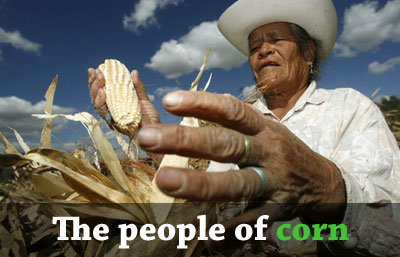Academic Reading 24 - Passage 1

By Laura Carlsen, The New Internationalist | December 1, 2004
Maize is Mexico’s lifeblood – the country’s history and identity are entwined with it. But this centuries-old relationship is now threatened by free trade. Laura Carlsen investigates the threat and profiles a growing activist movement.
On a mountain top in southern Mexico, Indian families gather. They chant and sprinkle cornmeal in consecration, praying for the success of their new crops, the unity of their communities and the health of their families. In this village in Oaxaca people eat corn tamales, sow maize plots and teach children to care for the plant. The cultural rhythms of this community, its labours, rituals and celebrations will be defined – as they have been for millennia – by the lifecycle of corn. Indeed, if it weren’t for the domestication of teocintle (the ancestor of modern maize) 9,000 years ago mesoamerican civilization could never have developed. In the Mayan sacred book, the Popol Vuh, the gods create people out of cornmeal. The ‘people of corn’ flourished and built one of the most remarkable cultures in human history.
But in Mexico and Central America today maize has come under attack. As a result of the North American Free Trade Agreement (NAFTA) Mexico has been flooded with imported corn from north of the border in the US. The contamination of native varieties with genetically modified imported maize could have major consequences for Mexican campesinos (farmers), for local biodiversity and for the world’s genetic reserves.
A decade ago Mexican bureaucrats and business people had it all figured out. NAFTA would drive ‘uncompetitive’ maize farmers from the countryside to work in booming assembly factories across the country. Their standard of living would rise as the cost of providing services like electricity and water to scattered rural communities would fall. Best of all, cheap imported maize from the US – the world’s most efficient and most heavily subsidized producer – would be a benefit to Mexican consumers.
Unfortunately, it didn’t turn out that way. There weren’t quite enough of those factory jobs and the ones that did materialize continued to be along the US border, not further in Mexico. And despite a huge drop in the price farmers received for their corn, consumers often ended up paying more. The price of tortillas – the country’s staple food – rose nearly fivefold as the Government stopped domestic subsidies and giant agribusiness firms took over the market. Free trade defenders like Mexico’s former Under-Secretary of Agriculture Luis Tellez suggest: ‘It’s not that NAFTA failed, it’s just that reality didn’t turn out the way we planned it.’ Part of that reality was that the Government did nothing to help campesinos in the supposed transition. Nor did NAFTA recognize inequalities or create compensation funds to help the victims of free trade – unlike what occurred with economic integration in the European Union.
Basically, Mexico adopted a sink-or-swim policy for small farmers, opening the floodgates to tons of imported US corn. Maize imports tripled under NAFTA and producer prices fell by half. The drop in income immediately hit the most vulnerable and poorest members of rural society. While more than a third of the corn grown by small farmers is used to feed their families, the rest is sold on local markets. Without this critical cash, rural living standards plunged.
Maize is at the heart of indigenous and campesino identity. José Carrillo de la Cruz, a Huichol Indian from northern Jalisco, describes that relationship: ‘Corn is the force, the life and the strength of the Huichol. If there were a change, if someone from outside patented our corn, it would end our life and existence.’
The good news is that the free-trade threat to Mexico’s culture and food security has sparked a lively resistance. ‘In Defence of Corn’, a movement to protect local maize varieties, is not a membership organization but a series of forums and actions led by campesinos themselves. It’s a direct challenge to both free trade and the dictums of corporate science.
The farmers’ tenacity and refusal to abandon the crop of their ancestors is impressive. But larger economic conditions continue to shape their lives. Rural poverty and hunger have soared under free trade – and placed a heavier burden on women left to work the land. The battle for food sovereignty continues. Movement leaders insist that the Government reassess its free trade policies and develop a real rural development programme.
